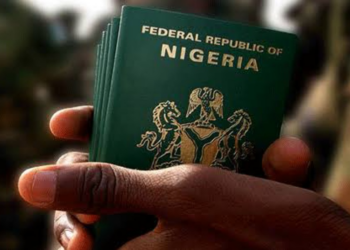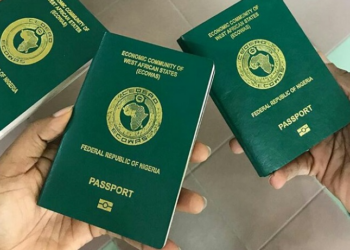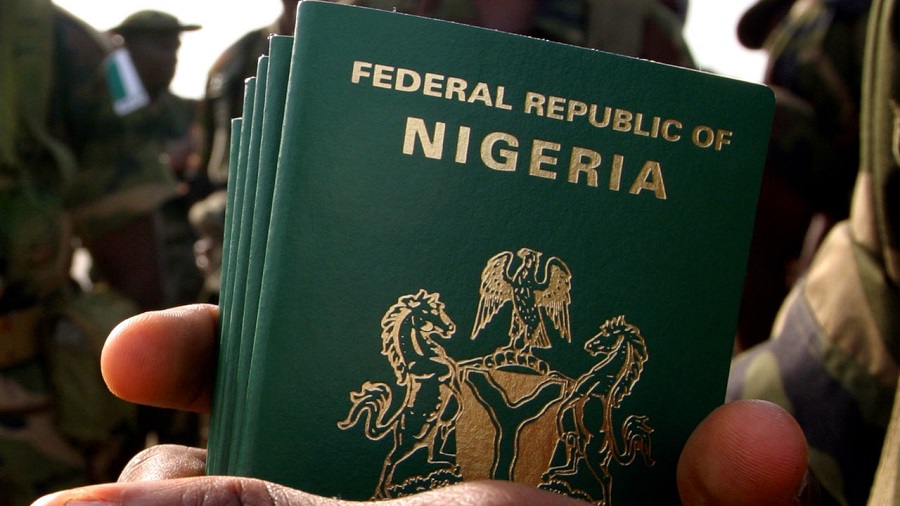Nigeria, a nation with a population of over 200 million people, has found itself at the bottom of the global passport ranking, offering visa-free access to a mere 46 countries.
This disheartening revelation comes from a recent report by Henley and Partners in partnership with IATA, which placed Nigeria at the 90th position, tying with South Sudan.
Among African countries, Nigeria’s passport stands as the fifth lowest in terms of visa-free travel opportunities.
The country only fares slightly better than the Democratic Republic of Congo (DRC), Eritrea, Sudan, and Libya, all of which face significant challenges related to insecurity and violence.
In stark contrast, South Africa leads the continent with the best-performing passport, allowing its citizens to visit 106 countries without the need for visas. Botswana closely follows with access to 89 countries, trailed by Papua New Guinea (83 countries), Namibia (81 countries), Kenya (76 countries), Malawi (75 countries), and Tunisia (71 countries).
Singapore takes the top spot globally, boasting an impressive 192 countries that its citizens can visit visa-free out of 227 total countries.
This has unseated Japan from its number one position after holding the title for five consecutive years.
Germany, Spain, and Italy share the No. 2 spot, granting their citizens visa-free access to an impressive 190 countries. Not far behind, Japan, South Korea, Austria, Finland, France, Luxembourg, and Sweden jointly hold the third spot with access to 189 other countries without visas.
Denmark, Ireland, the Netherlands, and the United Kingdom secure the No. 4 position, enabling their passport holders to visit about 188 countries without visa requirements.
At the other end of the spectrum, countries like Afghanistan, Iraq, Syria, Pakistan, and Yemen rank at rock bottom, offering their citizens access to no more than 35 countries visa-free.
The report underscores the importance of a strong passport and the opportunities it opens for travel and global mobility.
While some countries enjoy robust passport privileges, providing extensive opportunities for their citizens, others like Nigeria face challenges at the bottom, constrained by limited visa-free access.
To enhance Nigeria’s passport ranking and create greater opportunities for its citizens, strategic policies and strengthened diplomatic relations with other nations may be necessary.
By seeking to expand visa-free access and fostering economic and social ties on the global stage, Nigeria can aim to improve its standing in the global passport rankings and open new prospects for its citizens.





















Most countries around the world follow the principle of diplomatic reciprocity.
To improve diplomatic relations and the green passport’s reputation, Nigeria must make itself more appealing to foreign tourists. This involves cleaning up MMIA, enhancing leadership and talent in consulates worldwide. Simplify visa processes for foreign visitors, address issues at MMIA, and stop exploiting foreigners. Treat the diaspora better too.
Otherwise, Nigerians will continue facing mistreatment when seeking visas or crossing borders.
NIGERIANS (as in ordinary Nigerian CITIZENS) are the reason Nigerians face difficulties in obtaining visas and crossing borders.
The Seychelles recent barring of Nigerian visitors, among others, was NOT caused by the lack of “cleanliness of the MMIA”.
*The Seychelles recent barring of Nigerian visitors was NOT caused by failure to “clean up” MMIA.
Contrary to rumors, Seychelles didn’t permanently ban Nigerians. 13 Nigerian citizens over a two week period were arrested for carrying drugs, leading to a temporary suspension of the visa-free arrangement between the two nations.
Seychelles rightly criticizes MMIA’s laxity in blocking drug trafficking from Nigeria, while it prioritizing prevention with friendly nations. Seychelles has one of the world’s worst heroin problems, but you have never once seen their citizens smuggling to other friendly nations, because they stop it at their border. That’s diplomatic reciprocity at work. Diplomatic reciprocity also means improving Nigeria’s customs and security systems in order to ease concerns of other nations, in the same way that other nations work hard to protect Nigeria from their own problematic citizens.
Cleaning up MMIA and other Nigerian airports figuratively means revamping customs, security, and immigration processes.
Please see the forest from the trees.
We know the Seychelles didn’t permanently bar Nigerian visitors, but that’s missing the forest for the trees. The temporary suspension was as a result of the actions of Nigerian CITIZENS – and was not just a one-off. No nation takes such actions based on isolated incidents.
Not to hold brief for the NDLEA (or the Nigerian government), but there are scores of arrests made at Nigerian international airports of drug-carrying Nigerian passengers – much more than in so many other African nations that are not barred (temporarily or otherwise) or have visa difficulties abroad.
Until we correctly diagnose and face up to our real problems, we will never redress same. When the nationals of other nations discuss “Nigeria” more often than not (in fact, almost always, to be brutally honest) it is about the actions and behavior of Nigerian CITIZENS in their nations, not the Nigerian government.
I agree with most of your points, except the last line. Nigeria’s challenges primarily lie in governance, not its citizens or culture. Despite issues caused by some Nigerians abroad, countries worldwide are willing to accept Nigerian immigrants due to their integrity, industriousness, and intelligence. Nigeria still remains the single largest source of human capital from Africa to the rest of the world.
In contrast, the Nigerian government consistently demonstrates a lack of responsibility in governing for its people’s benefit. This is evident diplomatically through the government’s apathy towards its foreign citizens and its failure to promptly resolve crises caused by its own nationals abroad.
Other countries, such as those in Latin America and Southeast Asia, may have a similar or even much higher involvement in the drug trade, but their governments have gained international trust by actively working to solve problems with their counterparts. This is why their passports are stronger, despite actions by their citizens, unlike Nigeria’s.